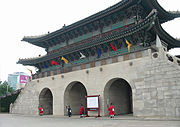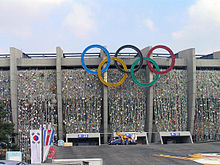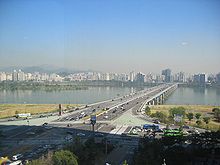- Seoul International Marathon
-
Not to be confused with JoongAng Seoul Marathon.
Seoul International Marathon 
The main gate to Gyeongbokgung Palace on Gwanghwamun Plaza, where the race beginsDate Mid-March Location Seoul, South Korea 
Event type Road Distance Marathon Established 1993 Official site Gyeongju Marathon The Seoul International Marathon, also known as the Dong-A Ilbo Seoul Marathon, is an annual marathon race that takes place in Seoul, South Korea. It is one of two annual races over the 42.195 km classic distance in the city, alongside the JoongAng Seoul Marathon which is held in November.[1] It holds IAAF Gold Label Road Race status.[2] First held in 1931, it is the third longest-running road running competition in Asia after the Hakone Ekiden and Chugoku Yamaguchi Ekiden in Japan.[3]
The race has been integral to the elite level of the sport in Korea, as ten of the 28 South Korean national records in the marathon have been set at the competition.[4] In addition to the marathon, the event also features half marathon, 10 km and 5 km races for public fun runners. The day's races attract around 20,000 people on a yearly basis.
Contents
History
The genesis of the competition is traced back to the Youngdungpo Marathon, which was first held in 1931. It was not a true marathon and the looped course in the city measured roughly 50 ris (around 14.5 miles or 23.3 km). The race was contested between fourteen of the country's top male runners and Seoul's Kim Eun-Bae won the first edition. Kim and the 1933 winner Sohn Kee-chung both went on to compete at the Olympic marathon, although they did so under the flag of Japan as Korea was part of the Japanese empire at that time.[5]
 Censorship of the Japanese flag on images of Korean-born Olympic champion Sohn Kee-chung (centre) led to a ban on the 1937 Seoul race.
Censorship of the Japanese flag on images of Korean-born Olympic champion Sohn Kee-chung (centre) led to a ban on the 1937 Seoul race.
This fact contributed to the suspension of the 1937 race: the event's sponsor, Korean broadsheet the Dong-A Ilbo, censored the Japanese flag in its reports of Sohn's marathon victory at the 1936 Berlin Olympics and the ruling Japanese military junta responded by suspending both the newspaper and the race.[6] The race returned as an annual fixture from 1938 to 1940 but was again discontinued, initially due to World War II and later because of the Korean War. The race returned on April 1954 and Im Jong-Woo became the first person to win twice, taking back-to-back victories in 1954 and 1955.[7]
The competition's first official full-length marathon was contested in 1964 and the change brought about improvements in the national standards as Lee Myeong-Jeong set a South Korea record to win in 1965 and Kim Bong-Nae became the first Korean to run under two hours twenty minutes a year later.[8] At the 1970 edition, Canadian Ron Wallingford and two Japanese runners provided the race with its first international competitors. The quality of the field saw domestic runner Kim Cha-Wan react with a national record run of 2:17:34.4 to win the race. Kim improved his mark again in 1973 and went on to become the Dong-A Marathon's most prolific winner, scoring four victories in the 1970s.[6][9] Japanese marathoner Toyoichi Masuda became the first foreign winner in 1977 and he was soon joined by his countryman Makoto Matsuzaki, who won two years afterwards. A women's 10 km race was added to the programme in 1979 and Moon Ki-sook became the first women's Dong-A champion.[10]
Im Eun-Joo won a women's 30 km race in 1981 and female runners were allowed to take on the full marathon distance the following year.[6] She went on to claim three straight marathon titles from 1983 to 1985.[11] The 1982 race hosted a dual domestic and international race, with results kept separate for the divisions.[6] In anticipation of the 1988 Seoul Olympics, the city also hosted separate international races from 1983 up to 1987 (which was the IAAF World Marathon Cup race).[12] The Dong-A competition in the 1980s saw the men's record reach 2:12 territory through Jang-hee Lee in 1987.[11]
 Seoul's Olympic Stadium, where the race finishes
Seoul's Olympic Stadium, where the race finishes
With the advent of another decade, Won-Tak Kim brought the men's record down to 2:11:38 in 1990. Hwang Young-cho, Seoul's winner in 1991, went on to take the gold medal at the 1992 Barcelona Olympics. Wan-Ki Kim reduced the national record further to 2:09:25 in 1993. The marathon was moved to Chuncheon for the 1992 event and had a seven-year stint in Gyeongju from 1993 to 1999. It returned to Seoul in 2000,[6] but its impact in the latter city led to the creation of the Gyeongju International Marathon.[13]
The event took on a more international nature from 1994 onwards, renaming itself the Dong-A International Marathon; following the invitation of runners from twelve countries, Manuel Matias of Portugal became the first winner from outside of Korea and Japan.[14] The marathon reached a landmark of over 10,000 starters in 1999 as 11,303 runners signed up for the full distance in the elite and popular races.[15]
China's Wei Yanan brought the women's record down to 2:25:06 in 2002, knocking over five minutes off the previous course best. Gert Thys had two consecutive victories in 2003 and 2004 (recording a record time of 2:07:06 in the latter), but a third win in 2006 was erased after he failed a drugs test for the banned steroid norandrosterone.[6] That year Zhou Chunxiu of PR China became the seventh woman to ever finish under two hours and twenty minutes as she set the women's record at 2:19:51 hours.[16] Kenyan runner Sylvester Teimet set the current men's record in 2010 with his win in 2:06:49 hours.[6]
Course
 The route crosses the bridge over the city's Han River.
The route crosses the bridge over the city's Han River.
The competition begins at Gwanghwamun Plaza in the city centre and finishes within the Olympic Stadium.[17] The course has a point-to-point format and traces a south-easterly path through the city centre. After departing from the main plaza, the route flows into Sejongno thoroughfare and passes the statue of Yi Sun-sin. The runners then pass the Namdaemun gateway and head through Cheonggyecheon park. The route traces a pass through Dongdaemun-gu district before crossing the Han River to head towards the stadium finishing point.[18]
Past winners
Pre-marathon
 Sohn Kee-chung won the competition in 1933, three years before his Olympic marathon win.
Sohn Kee-chung won the competition in 1933, three years before his Olympic marathon win.
Key: 14.5-mile race 15-mile race race
Note: All other years approx 25 km (16 mi)Edition Year Men's winner Time (h:m:s) 1st 1931  Kim Eun-Bae (KOR)
Kim Eun-Bae (KOR)1:22:05 2nd 1932  Byun Yong-Han (KOR)
Byun Yong-Han (KOR)1:21:51 3rd 1933  Sohn Kee-chung (KOR)
Sohn Kee-chung (KOR)1:24:03 4th 1934  Yoo Jang-Choon (KOR)
Yoo Jang-Choon (KOR)1:20:34 5th 1935  Lee Tae-Woo (KOR)
Lee Tae-Woo (KOR)1:22:43 6th 1936  Oh Dong-Woo (KOR)
Oh Dong-Woo (KOR)1:20:11 — 1937 Banned 7th 1938  Yoo Koan-Huang (KOR)
Yoo Koan-Huang (KOR)1:29:09 8th 1939  Ji Young-Ryung (KOR)
Ji Young-Ryung (KOR)1:28:12 9th 1940  Hyun Jung-Hyo (KOR)
Hyun Jung-Hyo (KOR)1:29:02 Not held from 1941–1953 due to World War II and Korean War 10th 1954  Im Jong-Woo (KOR)
Im Jong-Woo (KOR)1:23:43 11th 1955  Im Jong-Woo (KOR)
Im Jong-Woo (KOR)1:23:16 12th 1956  Han Seung-Chul (KOR)
Han Seung-Chul (KOR)1:21:42 13th 1957  Lee Chang-Hoon (KOR)
Lee Chang-Hoon (KOR)1:20:28 14th 1958  Oh Chun-Taek (KOR)
Oh Chun-Taek (KOR)1:21:15 15th 1959  Lee Sang-Chul (KOR)
Lee Sang-Chul (KOR)1:20:12 16th 1960  Cha Dae-Man (KOR)
Cha Dae-Man (KOR)1:20:17 17th 1961  Kang Yang-Tae (KOR)
Kang Yang-Tae (KOR)1:19:55 18th 1962  Han Jae-Duk (KOR)
Han Jae-Duk (KOR)1:18:54 19th 1963  Kim Bong-Nae (KOR)
Kim Bong-Nae (KOR)1:21:53 Marathon
 Abel Antón of Spain was among the first foreign winners.
Abel Antón of Spain was among the first foreign winners.
 China's Zhou Chunxiu is the current women's record holder.
China's Zhou Chunxiu is the current women's record holder.
Key: Course record Asian championship race
Edition Year Men's winner Time (h:m:s) Women's winner Time (h:m:s) 20th 1964  Lee Chang-Hoon (KOR)
Lee Chang-Hoon (KOR)2:27:13.8 — — 21st 1965  Lee Myung-Jung (KOR)
Lee Myung-Jung (KOR)2:21:21.6 — — 22nd 1966  Kim Bong-Nae (KOR)
Kim Bong-Nae (KOR)2:19:07 — — 23rd 1967  Yu Myung-Jong (KOR)
Yu Myung-Jong (KOR)2:19:44 — — 24th 1968  Kim Bong-Nae (KOR)
Kim Bong-Nae (KOR)2:19:42.9 — — 25th 1969  Song Keum-Yong (KOR)
Song Keum-Yong (KOR)2:20:28 — — 26th 1970  Kim Cha-Wan (KOR)
Kim Cha-Wan (KOR)2:17:34.4 — — 27th 1971  Cho Je-Hyung (KOR)
Cho Je-Hyung (KOR)2:19:15.8 — — 28th 1972  Kim Cha-Wan (KOR)
Kim Cha-Wan (KOR)2:19:34.4 — — 29th 1973  Kim Cha-Wan (KOR)
Kim Cha-Wan (KOR)2:17:01 — — 30th 1974  Moon Heung-Ju (KOR)
Moon Heung-Ju (KOR)2:16:15 — — 31st 1975  Moon Heung-Ju (KOR)
Moon Heung-Ju (KOR)2:21:09.6 — — 32nd 1976  Park Won-Keun (KOR)
Park Won-Keun (KOR)2:18:20 — — 33rd 1977  Toyoichi Masuda (JPN)
Toyoichi Masuda (JPN)2:18:40 — — 34th 1978  Kim Cha-Wan (KOR)
Kim Cha-Wan (KOR)2:17:01 — — 35th 1979  Makoto Matsuzaki (JPN)
Makoto Matsuzaki (JPN)2:17:18  Moon Ki-Sook (KOR)
Moon Ki-Sook (KOR)— (10 km) 36th 1980  Susumu Sato (JPN)
Susumu Sato (JPN)2:16:46 Unknown — 37th 1981  Lee Hong-Yul (KOR)
Lee Hong-Yul (KOR)2:21:23.4  Im Eun-Joo (KOR)
Im Eun-Joo (KOR)2:02:08 (30 km) 38th 1982  Kim Jong-Yun (KOR)
Kim Jong-Yun (KOR)2:16:58  An Chun-Ja (KOR)
An Chun-Ja (KOR)3:01:50 —[nb] 1982  Lawrie Whitty (AUS)
Lawrie Whitty (AUS)2:14:34  Allison Roe (NZL)
Allison Roe (NZL)2:43:12 39th 1983  Chae Hong-Nak (KOR)
Chae Hong-Nak (KOR)2:16:33  Im Eun-Joo (KOR)
Im Eun-Joo (KOR)2:48:13 40th 1984  Lee Hong-Yul (KOR)
Lee Hong-Yul (KOR)2:14:59  Im Eun-Joo (KOR)
Im Eun-Joo (KOR)2:39:48 41st 1985  Yoo Jae-Sung (KOR)
Yoo Jae-Sung (KOR)2:15:48  Im Eun-Joo (KOR)
Im Eun-Joo (KOR)2:45:06 42nd 1986  Yoo Jae-Sung (KOR)
Yoo Jae-Sung (KOR)2:14:06  Kim Mi-Kyung (KOR)
Kim Mi-Kyung (KOR)2:40:41 43rd 1987  Lee Jong-Hee (KOR)
Lee Jong-Hee (KOR)2:12:21  Ahn Young-Ok (KOR)
Ahn Young-Ok (KOR)2:41:50 44th 1988  Kim Won-Tak (KOR)
Kim Won-Tak (KOR)2:12:41  Lee Mi-Ok (KOR)
Lee Mi-Ok (KOR)2:33:14 45th 1989  Im Jung-Tae (KOR)
Im Jung-Tae (KOR)2:15:18  Lee Mi-Ok (KOR)
Lee Mi-Ok (KOR)2:39:27 46th 1990  Kim Won-Tak (KOR)
Kim Won-Tak (KOR)2:11:38  Lee Mi-Ok (KOR)
Lee Mi-Ok (KOR)2:37:15 47th 1991  Hwang Yeong-Cho (KOR)
Hwang Yeong-Cho (KOR)2:12:35  Lee Mi-Ok (KOR)
Lee Mi-Ok (KOR)2:41:43 48th 1992  Kim Jae-Ryong (KOR)
Kim Jae-Ryong (KOR)2:09:30  Lee Mi-Ok (KOR)
Lee Mi-Ok (KOR)2:36:44 49th 1993  Kim Wan-Ki (KOR)
Kim Wan-Ki (KOR)2:09:25  Chung Young-Im (KOR)
Chung Young-Im (KOR)2:45:52 50th 1994  Manuel Matias (POR)
Manuel Matias (POR)2:08:33  Lee Mi-Kyung (KOR)
Lee Mi-Kyung (KOR)2:35:44 51st 1995  Lee Bong-Ju (KOR)
Lee Bong-Ju (KOR)2:10:58  Lee Mi-Kyung (KOR)
Lee Mi-Kyung (KOR)2:38:08 52nd 1996  Martín Fiz (ESP)
Martín Fiz (ESP)2:08:25  Oh Mi-Ja (KOR)
Oh Mi-Ja (KOR)2:30:09 53rd 1997  Abel Antón (ESP)
Abel Antón (ESP)2:12:37  Bang Seon-Hee (KOR)
Bang Seon-Hee (KOR)2:43:40 54th 1998  Kim Yi-Yong (KOR)
Kim Yi-Yong (KOR)2:12:24  Oh Mi-Ja (KOR)
Oh Mi-Ja (KOR)2:37:16 55th 1999  Hyung Jae-Young (KOR)
Hyung Jae-Young (KOR)2:11:34  Oh Jung-Hee (KOR)
Oh Jung-Hee (KOR)2:35:11 56th 2000  Chung Nam-Kyun (KOR)
Chung Nam-Kyun (KOR)2:11:29  Park Ko-Eun (KOR)
Park Ko-Eun (KOR)2:33:06 57th 2001  Josiah Bembe (RSA)
Josiah Bembe (RSA)2:11:49  Yun Sun-Suk (KOR)
Yun Sun-Suk (KOR)2:32:09 58th 2002  Atsushi Fujita (JPN)
Atsushi Fujita (JPN)2:11:22  Wei Yanan (CHN)
Wei Yanan (CHN)2:25:06 59th 2003  Gert Thys (RSA)
Gert Thys (RSA)2:08:42  Zhang Shujing (CHN)
Zhang Shujing (CHN)2:23:18 60th 2004  Gert Thys (RSA)
Gert Thys (RSA)2:07:06  Lee Eun-Jung (KOR)
Lee Eun-Jung (KOR)2:26:17 61st 2005  William Kipsang (KEN)
William Kipsang (KEN)2:08:53  Zhou Chunxiu (CHN)
Zhou Chunxiu (CHN)2:23:24 62nd 2006  Jason Mbote (KEN)
Jason Mbote (KEN)2:11:40  Zhou Chunxiu (CHN)
Zhou Chunxiu (CHN)2:19:51 63rd 2007  Lee Bong-Ju (KOR)
Lee Bong-Ju (KOR)2:08:04  Wei Yanan (CHN)
Wei Yanan (CHN)2:23:12 64th 2008  Sammy Korir (KEN)
Sammy Korir (KEN)2:07:32  Zhang Shujing (CHN)
Zhang Shujing (CHN)2:26:11 65th 2009  Moses Kimeli Arusei (KEN)
Moses Kimeli Arusei (KEN)2:07:54  Robe Guta (ETH)
Robe Guta (ETH)2:25:37 66th 2010  Sylvester Teimet (KEN)
Sylvester Teimet (KEN)2:06:49  Amane Gobena (ETH)
Amane Gobena (ETH)2:24:13 67th 2011  Abderrahim Goumri (MAR)
Abderrahim Goumri (MAR)2:09:11  Robe Guta (ETH)
Robe Guta (ETH)2:26:51 Notes
- nb An international race and a domestic race were held simultaneously in 1982, with results being kept separately for each category.[6][19]
References
- ^ Jalava, Mirko (2005-11-07). Kiplagat takes 2:08 course record victory in Seoul. IAAF. Retrieved on 2011-03-19.
- ^ IAAF Label Road Racing. IAAF (2011). Retrieved on 2011-03-19.
- ^ Longest Running Road Races. Association of Road Racing Statisticians (2011-03-08). Retrieved on 2011-03-19.
- ^ Dong-A Seoul Int`l Marathon ready to join world`s elite. Dong-A Ilbo (2010-03-08). Retrieved on 2011-03-19.
- ^ History (pg. 1). Dong-A Marathon. Retrieved on 2011-03-19.
- ^ a b c d e f g h Seoul International Marathon. Association of Road Racing Statisticians (2010-03-23). Retrieved on 2011-03-19.
- ^ History (pg. 2). Dong-A Marathon. Retrieved on 2011-03-19.
- ^ History (pg. 4). Dong-A Marathon. Retrieved on 2011-03-19.
- ^ History (pg. 6). Dong-A Marathon. Retrieved on 2011-03-19.
- ^ History (pg. 7). Dong-A Marathon. Retrieved on 2011-03-19.
- ^ a b History (pg. 9). Dong-A Marathon. Retrieved on 2011-03-19.
- ^ Heyworth, Malcolm (2011-03-09). IAAF World Cup Marathon. Association of Road Racing Statisticians. Retrieved on 2011-03-19.
- ^ Kenyan Marathoners Sweep Gyeongju Marathon. The Dong-a Ilbo (2007-10-22). Retrieved on 2011-03-19.
- ^ History (pg. 10). Dong-A Marathon. Retrieved on 2011-03-19.
- ^ History (pg.11). Dong-A Marathon. Retrieved on 2011-03-19.
- ^ Turner, Chris & Jalava, Mirko (2006-03-14). Zhou Chunxiu becomes seventh woman to run a sub-2:20 Marathon. IAAF. Retrieved on 2011-03-19.
- ^ 2011 Seoul International Marathon Information. Dong-A Marathon. Retrieved on 2011-03-19.
- ^ Course Map. Dong-A Marathon (2011). Retrieved on 2011-03-19.
- ^ AIMS 1982–2007: 25 Years of Running History. Association of International Marathons and Distance Races (2007). Retrieved on 2011-03-19.
- List of winners
- Seoul International Marathon. Association of Road Racing Statisticians (2010-03-23). Retrieved on 2011-03-19.
External links
IAAF Gold Label Road Races Xiamen International Marathon • Mumbai Marathon • Tokyo Marathon • World's Best 10K Race • Lake Biwa Marathon • Lisbon Half Marathon • Maratona di Roma • Seoul International Marathon • Prague Half Marathon • Paris International Marathon • London Marathon • Boston Marathon • Prague International Marathon • Great Manchester Run • World 10K Bangalore • Bogota International Half Marathon • Great North Run • Berlin Marathon • Portugal Half Marathon • Chicago Marathon • Beijing International Marathon • Delhi Half Marathon • Frankfurt Marathon • Great South Run • New York City Marathon • Fukuoka Marathon Categories:
Categories:- Athletics in South Korea
- Marathons in South Korea
- Sport in Seoul
- Recurring sporting events established in 1931
Wikimedia Foundation. 2010.



